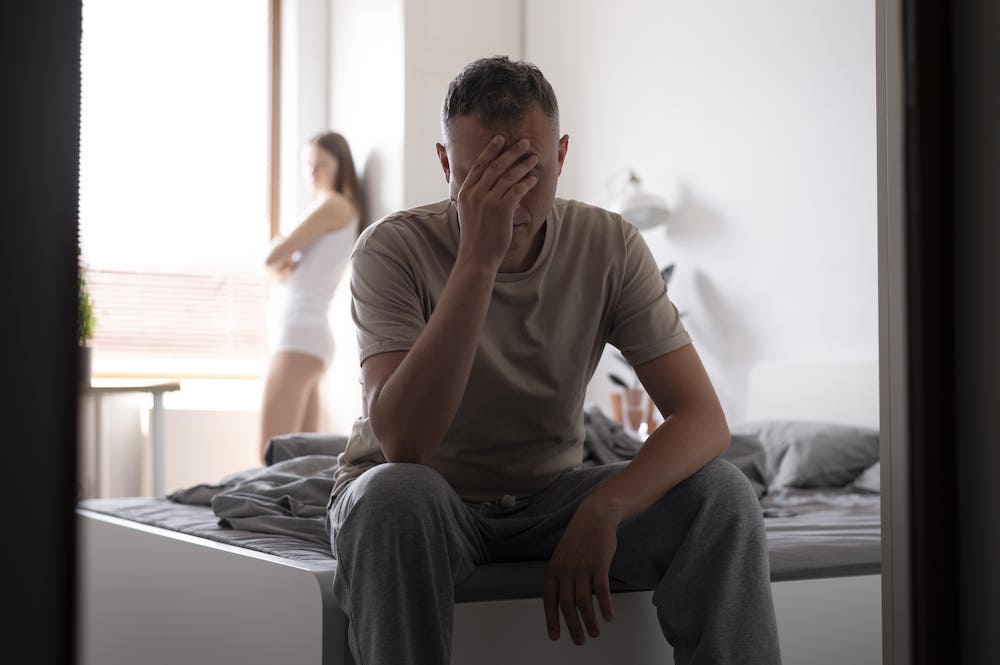Postcoital dysphoria (PCD), post-sex blues, or postcoital tristesse involves feelings like agitation, sadness, and anxiety shortly after a sexual experience in which both persons voluntarily participated.

Do I Have Postcoital Dysphoria?
Postcoital dysphoria is surprisingly common and can be caused by various issues. However, if you often feel upset after sex, speaking with a therapist may be the best solution.
What is Postcoital Dysphoria
Postcoital dysphoria is when a person feels deep sadness, shame, irritation, or anger right after sex or masturbation.
Consensual sexual contact is often seen as a physically and emotionally pleasurable experience. Still, it can also cause a lot of stress for some people.
Postcoital dysphoria happens soon following a sexual activity in which both persons participated willingly and enjoyed it. Because of its context, symptoms are unexpected, making it even harder to accept and understand the bad feelings that follow.
How Common Is It?
An enjoyable sexual experience might provoke intense emotions. While these are often pleasant feelings, some people may get teary and suffer unexplainable feelings of sadness, irritability, anxiety, or even depression following otherwise satisfying and consensual sexual activity.
Postcoital Dysphoria Females
One survey found that 46.2% of women have experienced PCD at some point in their lives. At the same time, between 5 and 10% of women have experienced postcoital dysphoria in the previous four weeks, while 2% of surveyed females stated that they have regularly experienced PCD during their lifetime.
Postcoital Dysphoria Male
A study of 1,208 men showed that male postcoital dysphoria is also common. This survey showed that 41% of men have dealt with PCD in their lives – about 20% of them experienced postcoital dysphoria during the previous four weeks, while around 3 to 4% of the surveyed males reported that they experience PCD regularly.
Possible Causes
Since postcoital dysphoria hasn’t been studied in depth, we still don’t fully understand it. Although PCD may result from relationship distress, it also occurs in people in happy, trusting relationships. So, you might experience negative emotions after having sex with a caring and loving partner with whom you don’t have any underlying problems in your relationship.
Some authors associate PCD with the following factors:
- Sexual dysfunction in men
- Genetics
- Personal traits
- Postnatal depression
- Greater emotional reactivity
- Attachment style
- Childhood sexual abuse and trauma
- Adult sexual trauma
- Underlying psychological distress
Sexual Dysfunction and PCD
Postcoital dysphoria is not linked to sexual dysfunction in women. However, men with PCD are more likely to feel bad after having a sexual encounter because they are worried about their sexual performance and feel ashamed.

Insecure Attachment and PCD
For instance, people with an anxious or avoidant attachment style may find it harder to differentiate themselves and balance closeness and independence in a relationship. So, they may experience anxiety, mistrust, and a loss of control during sexual intercourse, which may result in deep emotional distress.
Childhood Sexual Trauma and PCD
According to research, those who suffered sexual abuse as children are more likely to have postcoital dysphoria in adulthood. In these individuals, sexual activity may trigger emotional stress and post-traumatic stress disorder (PTSD) symptoms.
Underlying Psychological Distress
If you struggle with stress, anxiety, or depression, a sexual experience with a loving partner you care about might be cathartic. As a result, your worry or concern about other aspects of your life may burst after sex.
What Difficulties Can Postcoital Dysphoria Cause?
PCD might cause further mental health issues, such as anxiety, depression, loneliness, low self-esteem, and substance abuse. It may trigger or aggravate problems in your relationship and generate self-criticism and feelings of worthlessness and hopelessness.
It is, therefore, essential to address your concerns with a professional as you require treatment if you experience ongoing or intense postcoital dysphoria symptoms.
Symptoms
Postcoital dysphoria might manifest differently in different people. However, PCD symptoms may include the following:
- Uncontrollable crying
- Unexplained feelings of sadness and depression
- Anxiety
- Shame, guilt, and regret
- Irritability and frustration
- Aggression
- Panic attacks
- Fatigue
- Numbness
- Extreme feelings of self-loathing

How is Postcoital Dysphoria Diagnosed
Although postcoital dysphoria is not classified as an official mental health illness in the DSM-5, if you complain of PCD, your doctor, psychologist, or another professional clinician may diagnose you with an unspecified sexual dysfunction.
Treatment Options
PCD therapy options may involve:
- Therapist intervention
- Self-help strategies
Therapist’s Intervention
If you have postcoital dysphoria, your doctor or psychotherapist may recommend one of the following options or their combination:
Individual therapy: it may help address underlying issues such as insecure attachment, childhood trauma, stress, self-limiting beliefs, or other conditions contributing to PCD.
Trauma therapy: therapeutic modalities such as EMDR can help address unresolved trauma that may be linked to postcoital dysphoria.
Psychosexual therapy: it can help work through anxiety, negative feelings about sex due to previous abuse or childhood trauma, differences in sexual desire, and other possible underlying issues contributing to PCD.
Couples therapy: couples counseling can help address underlying relationship problems, intimacy issues, and communication challenges.
Self-Help Methods
In addition to professional mental health help, there are some things you can do for yourself if post-sex blues symptoms overwhelm or cause relationship problems.
Self-Compassion
Being self-compassionate means accepting your imperfections and treating yourself with the kindness and care you would offer to a loved one. Don’t be harsh on yourself for feeling upset after having sex. Accept that this can happen to everyone.
Get Informed
The first step in overcoming PCD is to educate yourself on your condition. Trained and certified mental health professionals can educate you about your symptoms, what’s causing them, and what you can do to reduce them.
Keep a Journal
Journaling can be a great way to identify your triggers and keep track of your PCD symptoms. It can also help you recognize, accept, and work through painful feelings, which can help relieve some symptoms.
Tips for Coping with Postcoital Dysphoria
Here are a few more tips on how to help yourself and cure postcoital dystrophia:
- Communicate openly
- Give Yourself Time
- Practice mindfulness meditation
- Practice daily positive affirmations
- Keep a gratitude journal
- Try deep breathing relaxation exercise
When to Seek a Psychotherapist’s Help
Although it is common to have postcoital dysphoria at some point in your life, if it occurs frequently or causes discomfort, you should consult your doctor or a mental health specialist.
Postcoital dysphoria cure exists, and you are not alone in this experience.
A skilled psychotherapist can help you understand your condition and how it affects your life, normalize your experience, and practice self-help methods to overcome distress.



